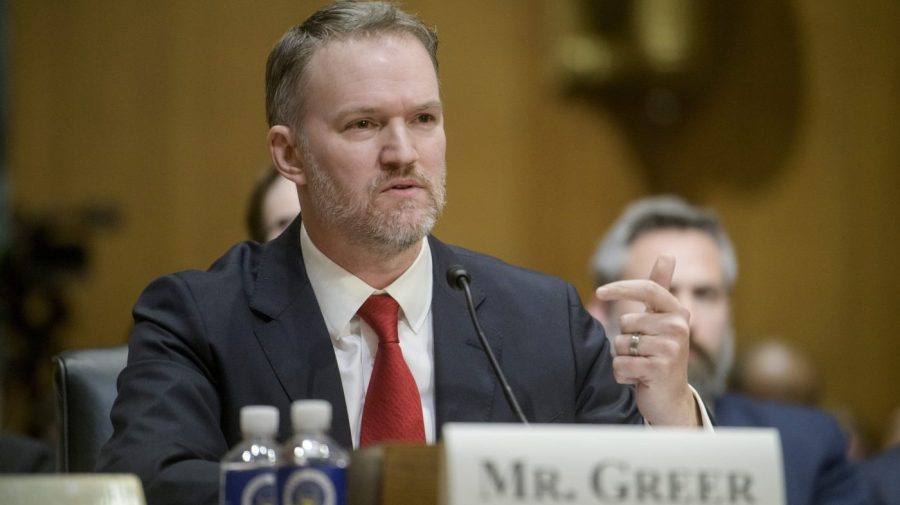
Senators on both sides of the aisle pressed U.S. Trade Representative Jamieson Greer on Tuesday in the wake of President Trump’s sweeping tariff actions.
Democrats leaped at the opportunity to pounce on Greer during his testimony before the Senate Finance Committee on Tuesday morning amid blowback over the latest tariffs, but Republicans also shared concerns from constituents.
“First of all, I think there’s agreement that we recognize that America has been very generous in opening up our markets, our trading partners have taken advantage of us,” Sen. Ron Johnson (R-Wisc.), a hardline conservative, said during the hearing. “We don’t have fair trade.”
“But I think you’re also hearing that we, our constituents, rely on trade, and they’re going to be harmed by it,” he continued. Johnson also said Republicans “want fair trade,” but he hopes Trump officials recognize that tariffs are “a somewhat blunt instrument.”
Other Republicans made similar concerns as members on both sides have raised since the Trump administration announced about $600 billion in new import taxes last week.
“On balance, I would say most of my constituents are supportive, and they recognize that some turbulence might be required in order to end up in a better spot and reset trade relations,” Sen. Todd Young (R-Ind.) said during the hearing, but he noted the weight of Trump’s sweeping tariff actions will be felt differently by Americans.
“It has a different impact on a New York tech firm that it might have on a Hoosier soybean farmer,” he said. “And I hope that’s something that’s being factored into your analysis as you think about how foreign counter measures could impact the American economy generally, and then in terms of particular sectors and parts of the country.”
Greer defended the recent tariffs as key to addressing what he described as a “large and persistent trade deficit” that he said was partly driven by nonreciprocal tariffs and economic policies pursued by the nation’s foreign trading partners.
“President Trump imposed tariffs to address this emergency and these measures are aimed squarely at achieving reciprocity and reducing our massive trade deficit to reshore production in the United States,” he said at the top of the hearing.
But there’s some anxiety in the financial markets in the U.S. and abroad as the Trump administration has faced rising pressure in Washington over the tariff strategy this month.
Treasury Secretary Scott Bessent told reporters on Tuesday that he expects “a couple of big trading partners make deals very quickly.”
But when asked about timing for trade negotiations with other countries, Greer cautioned during the hearing on Tuesday that the trade deficit won’t be “solved overnight.”
“What I can say is, I’m moving as quickly as possible, and a lot of these countries are moving very quickly, and we’re working on the weekends. We’re working at night, as folks want to engage on this,” Greer said.
He also said the president “has indicated that he is willing to negotiate, work with parties that want to pursue reciprocal trade with the United States.”
Young asked Greer on Tuesday if his office is “actively mapping out which sectors and regions are going to bear the brunt of certain retaliatory measures and thinking about contingency plans.”
Greer responded that “most countries” do not plan to retaliate and are reaching out for more information on how to adjust their trade policies in response to the tariffs.
He also faced questioning from Sen. Chuck Grassley (R-Iowa) as to whether the president’s tariff plans are “trade reciprocity or for Treasury replenishment.”
“In the medium to the long term, do you plan to turn these tariffs into trade deals to reduce tariffs and nontariff barriers?” he asked Greer. “I support that. On the other hand, if the purpose is to stall on negotiations in order to keep tariffs high for the sole purpose of feeding the U.S. Treasury, I oppose that.”
Grassley’s comments come after Peter Navarro, a senior trade adviser to Trump, recently argued that the president’s tariff plan could raise trillions of dollars in federal revenue in the coming years.
In response, Greer suggested that a revenue effect was “obviously” going to happen after imposing new tariffs, but the official also said the U.S. needs “to reshore manufacturing.”
“We need to get rid of our agricultural deficit and we need to make sure that if countries are going to trade with us, it has to be on a reciprocal basis,” he said.
Sen. Thom Tillis (R-N.C.) also expressed concerns about the president’s trade strategy on Tuesday, asking Greer, “Whose throat do I get to choke if this proves to be wrong?”
“It just seems like we’ve decided to begin a trade war on all fronts, and that’s okay, if the person who thought this through has an answer for why you go after partners that we have a very long storied relationship with,” he said.
“I wish you well, but I am skeptical.”

